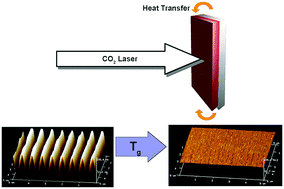Erasure of surface relief gratings in azobenzene molecular glasses by localized heating using a CO2 laser
Abstract
A thermo-optical process was developed for the erasure of surface relief gratings (SRG) inscribed on various films of mexylaminotriazine molecular glasses functionalized with different azobenzene chromophores, as well as azobenzene polymer films. Irradiation of the samples with a CO2 laser beam causes localized heating of the soda lime substrate, which is then transferred to the azobenzene films, causing complete erasure of the gratings while the temperature of each film was monitored in real time. The erasure temperature has been found to be strongly correlated with the respective glass transition temperature (Tg) of the materials. Therefore, complete and partial all-optical erasure of gratings was successfully demonstrated and occurred in under a minute for azobenzene molecular glass films and under 3 minutes for azo-polymer films. Finally, gratings were shown to erase in specific patterns through the use of a metallic mask.



 Please wait while we load your content...
Please wait while we load your content...